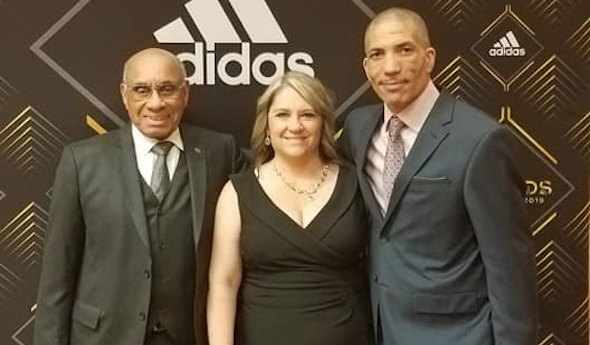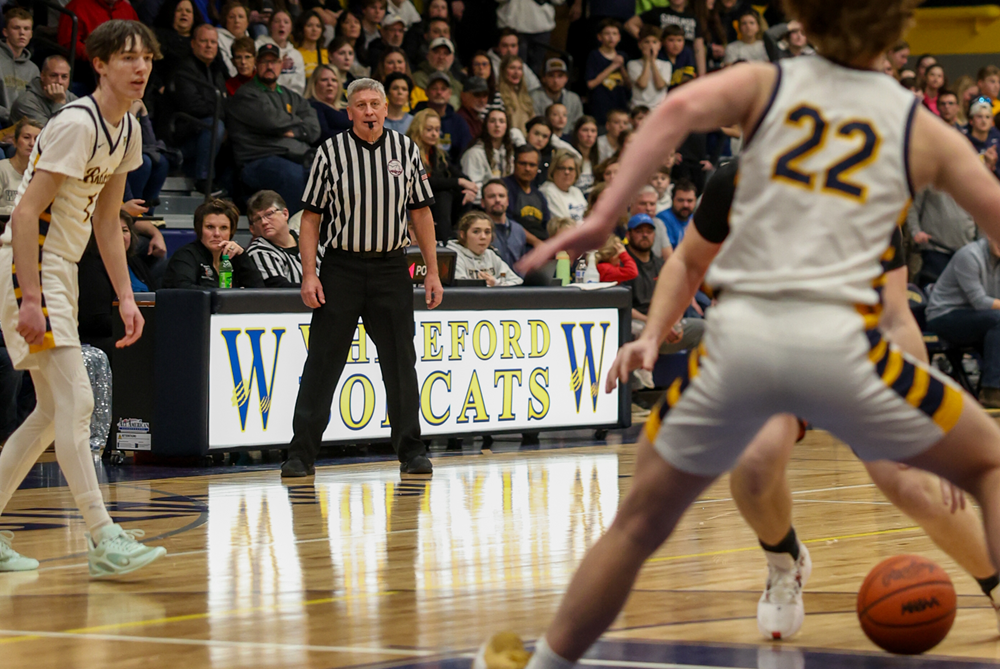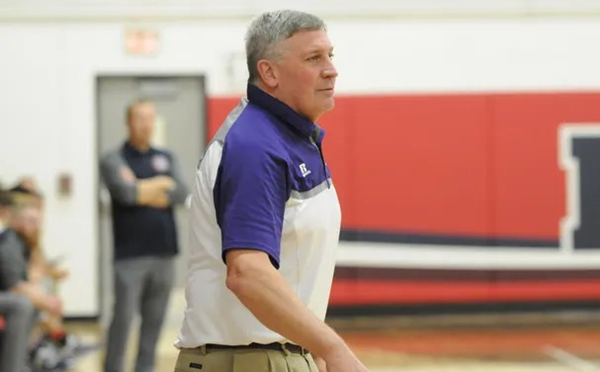
Flint's Phillips Named NHL 'Community Hero'
By
Paul Costanzo
Special for MHSAA.com
June 20, 2019
Rico Phillips had convinced himself before Wednesday night’s NHL Awards that he wasn’t going to win the Willie O’Ree Community Hero Award.
It was the easiest way to kill nerves that went along with having to speak in front of a room filled with NHL superstars and legends, as well as a national television audience.
But as the award was about to be announced, and a video montage started playing on the screen, the realization he could win started to come back to Phillips. Then O’Ree said his name.
“When I watched Willie O’Ree say my name, it was like this snapshot of time froze, and I was like, ‘No way,’” said Phillips, an MHSAA hockey official and the founder of the Flint Inner City Youth Hockey Program. “I embraced my wife. She has been the person that has been the best advisor to me, and to have her here with me was an incredible moment.”
Phillips was honored for founding and directing his organization, which has given a cost-free opportunity to play the game to about 150 kids ages 8-11 in Flint since 2010. He was one of three finalists, along with Tammi Lyncy of Washington, D.C., and Anthony Benavides of Detroit.
Fans submitted candidates for the award, and the field was whittled to the final three who were then voted on by the public.
The award is named after Hockey Hall of Famer O’Ree, who broke the NHL color barrier in 1958, and who has worked as the league’s diversity ambassador for more than 20 years. It is given to “an individual who – throughout the game of hockey – has positively impacted his or her community, culture or society,” according to a release from the NHL. This was the second year it has been awarded.
 “It was surreal, would be the first word,” Phillips said. “I felt an incredible honor – having just met Willie a couple months ago in person, he brings with him this magic. To look over and hear him say my name, it was like, ‘I can’t believe this is happening. Willie O’Ree – Willie O’Ree! – is giving me this award.”
“It was surreal, would be the first word,” Phillips said. “I felt an incredible honor – having just met Willie a couple months ago in person, he brings with him this magic. To look over and hear him say my name, it was like, ‘I can’t believe this is happening. Willie O’Ree – Willie O’Ree! – is giving me this award.”
Those who know Phillips could certainly believe it was happening, and that it was a well-deserved honor.
“I wasn’t surprised; I thought if anybody deserved that award, it was Rico,” said Steve Berriman, who serves as assigner and referee-in-chief for the Flint Ice Hockey Referees Association. “I was so darn proud; it was so well deserved. He’s immersed himself in the hockey culture. Whatever he’s accomplished has been all on Rico. He’s done it all himself. From where he’s started to where he’s come, and then the starting of this program, it’s 100 percent on him.”
Phillips, who is a firefighter in Flint, was introduced to the game during the 1980s and fell in love with it. He served as a student trainer for the hockey team at Flint Southwestern, and thanks to plenty of time spent with the officials while in that position, was convinced to get onto the ice wearing the stripes. He became an MHSAA registered official for ice hockey beginning with the 1990-91 season.
“I took up that challenge, and it was terrible at first, because I could barely skate,” Phillips said with a laugh. “One of the other challenges, besides learning how to skate, is that I was met with racial slurs and taunts. I was young, and it was tough. I thought, ‘What did I get myself into?’ I had some people who helped talk me through it.”
Phillips said those mentors explained to him that quitting would give those who taunted him what they wanted, and more than 30 years later, he’s still on the ice. He said he officiates about 40 high school games per year and has worked three MHSAA Semifinals and a handful of Quarterfinals.
It was during the late 1990s that the idea for the Flint Inner City Youth Hockey Program came to Phillips.
“As a hockey referee, in particular, it wasn’t just playing, I know the lack of cultural diversity (in hockey),” Phillips said. “It didn’t bother me, so to speak. But I thought, you know what, there’s something that can be done about this.”
About a decade later, he put the wheels in motion and went to the Flint-based Perani Hockey World to ask for financial assistance. Perani took things a step further, offering to outfit all of the players from head to toe, giving Phillips and his organization 54 sets of gear in total in the first year.
 After that first year, a funder fell through. But four years later, the United Way stepped in and provided funding to pay for ice time. The Flint Firebirds of the Ontario Hockey League have since stepped in to assist with ice time.
After that first year, a funder fell through. But four years later, the United Way stepped in and provided funding to pay for ice time. The Flint Firebirds of the Ontario Hockey League have since stepped in to assist with ice time.
“One of the things I appreciate about our program is that it’s a community collaborative effort,” Phillips said. “These folks give to us without a non-profit status.”
Since its inception, Phillips said that the program has served about 150 players. Each player not only receives gear and instruction at no cost, but also transportation to and from the arena.
“We have 12 that went on to continue playing hockey, which is huge,” Phillips said. “I’m very proud of that – I didn’t expect that. We help and seek out additional funding for our participants that come through to help with the cost as they move on. The kids that come to our program, they don’t understand or know about hockey or even ice skating. We’re taking these families and teaching them to love this sport.”
Phillips has been saddened by the decline of the sport in the Flint area, saying that when he began officiating there were more than 20 high school teams in the area, and now there are fewer than 10. He said he also struggles to fill his program each year.
He hopes that will change with the exposure that has come with this award.
“What I’m hoping is this opens up the doors a little more, that this brings some gravity,” Phillips said. “On the flip side, when talking about funding, (since he was announced as a finalist for the award) I’ve had owners of pro teams and others coming up to me saying, ‘We’re going to send you equipment and send you some funding.’ This definitely puts our program on the map – on the bigger map. It means a lot of more intense work that I have to do.”
The award also shined a positive light on Flint, which is something Phillips did not take for granted.
“It was an overwhelming response that I received from the community,” Phillips said. “There were watch parties – I just saw a video a little while ago of when the announcement was made, and they just went crazy. It means the world. I say this a lot of times, but there seems to be a dark cloud that likes to hang over Flint and has for decades. There are so many of us that are little lights that shine, and this was a big shining light. Every opportunity we get in Flint to pick our heads up and be proud is important.”
Click for more on the Willie O'Ree Community Hero Award.
PHOTOS: (Top) From right, Rico Phillips, wife Sandy and NHL Hall of Famer Willie O'Ree. (Middle) Phillips drops the puck for a face-off during the Division 3 Semifinal between Houghton and Riverview Gabriel Richard this winter. (Below) Phillips, left, with his award and the Nashville Predators' P.K. Subban. (Top and below photos courtesy of Rico Phillips.)

Sullivan Returns to Court After Coaching, Sees Game In New Ways as Official
By
Doug Donnelly
Special for MHSAA.com
February 6, 2024
Gary Sullivan is getting a whole new perspective on basketball.
 After 25 years of coaching the game on several levels – including the last six as the boys varsity coach at Blissfield Community Schools – Sullivan has replaced his school logo with stripes and a whistle. He’s enjoying his second basketball career, this time as a referee.
After 25 years of coaching the game on several levels – including the last six as the boys varsity coach at Blissfield Community Schools – Sullivan has replaced his school logo with stripes and a whistle. He’s enjoying his second basketball career, this time as a referee.
“I’m having a good time,” said Sullivan, who will retire this month as a teacher at Blissfield. “I’ve had fantastic experiences so far. I hope it stays that way.”
Sullivan is an Ohio native, having grown up just across the state line and attended Evergreen High School. After graduating from the University of Toledo, he landed a teaching job at Blissfield. Early on, he took a stab at officiating basketball.
“(Former Blissfield baseball coach) Larry Tuttle got me into it,” he said. “I did a few middle school and some junior varsity games. Then, when I became an athletic director pretty early in my career, I gave officiating up.”
He started coaching along the way, from youth sports to middle school basketball. He took over as the Blissfield varsity coach in 2016-17
After winning seven games over two seasons with an experienced roster, Blissfield rebounded with 12 wins in 2018-19 and 19 in 2019-20 – the most for Blissfield since 1992.
The Royals won Lenawee County Athletic Association and Division 2 District titles in 2021. The LCAA title was the first for the Royals since 2003, and the District championship was the first for the school since 2004. He won 60 games in all and earned two county Coach of the Year awards.
He stepped down as basketball coach two years ago.
It wasn’t long and he was being courted to help tackle the referee shortage in Michigan and across the country. His brother, Terry, is a basketball official in the Jackson area.
“When I was finished coaching, I started thinking about it again,” Sullivan said. “My brother does a ton of officiating in the Jackson area. He told me, ‘Just do it. It will be fun. What else are you going to do in the middle of the winter? You might as well referee.’ It gives you a chance to still be involved in the game.”
Initially, Sullivan figured he’d officiate a few middle school and junior varsity games. Once he got his feet wet and adjusted to life with the whistle, however, he was hooked.
 “Last year was my first year – that was my intention, do middle school and some JV, maybe a couple of days a week,” he said. “Before I knew it, they were assigning me games left and right. The more I did it, the more I liked it. By the end of the year, they had the chance to assign a couple of varsity games. No one complained too awful bad, and they gave me a few more.”
“Last year was my first year – that was my intention, do middle school and some JV, maybe a couple of days a week,” he said. “Before I knew it, they were assigning me games left and right. The more I did it, the more I liked it. By the end of the year, they had the chance to assign a couple of varsity games. No one complained too awful bad, and they gave me a few more.”
With his basketball background, Sullivan found being a referee an outlet for his competitive nature.
“Being around basketball has made it much easier for me than someone who just comes in and, ‘Hey, I’ll try to do this,’ he said. “You are competing with yourself a little to make the right call and keep the game flowing along.”
There have been a few unexpected moments in the transition from coach to referee.
For one, Sullivan said, being on the court is a completely different perspective than being on the sidelines.
“It is so much faster when you have to run and follow that person than it is when you sit there and watch it,” Sullivan said. “When you have to run, get to your primary spot, then keep the peripheral vision going to watch everything, it's much faster, more difficult than I ever anticipated.”
Sullivan said certain aspects of the game are different, too.
“As a coach, I always anticipated what I thought was going to happen,” he said. “In your mind you know someone is going to travel, then as soon as they travel, you are yelling ‘Travel!’ As an official, it is better to be a second late and be correct than a second early and be wrong.
“To me, the toughest transition has been to slow down, wait for the actual play to let itself run its course. Make sure it really was a foul. Think about it. Don’t get in a rush to make the call.”
He’s grateful to other area officials who have helped him learn the tricks of the trade during either formal training sessions or by example. He’s had the chance to review some of his games on film, which has helped him dissect the game from a new angle. He’s also learned from coaching to block out fans and people from the crowd who might disagree with a call.
“I have not had a negative experience yet from a fan,” he said. “As a former coach, I put myself on double probation – I dished out enough that maybe I’m a little more tolerant than some other officials. That’s just my personality at this point.”
This year Sullivan has had a full schedule of middle school games plus about a dozen girls varsity basketball games and a handful of boys varsity games. The most recent was Friday in Ottawa Lake in front of a big crowd watching rivals Whiteford and Summerfield.
“That was a ton of fun – full house, competitive game. I was glad to be a part of it,” Sullivan said.
There’s another bonus to being an official. When the game is over, he can go home and sleep. No more late nights watching film or scouting for the upcoming opponent.
“My cats are much happier,” he said. “I’m not waking up at 4:30 in the morning and watching a film, then going back to bed. It’s fun. I’m enjoying it.”
 Doug Donnelly has served as a sports and news reporter and city editor over 25 years, writing for the Daily Chief-Union in Upper Sandusky, Ohio from 1992-1995, the Monroe Evening News from 1995-2012 and the Adrian Daily Telegram since 2013. He's also written a book on high school basketball in Monroe County and compiles record books for various schools in southeast Michigan. E-mail him at [email protected] with story ideas for Jackson, Washtenaw, Hillsdale, Lenawee and Monroe counties.
Doug Donnelly has served as a sports and news reporter and city editor over 25 years, writing for the Daily Chief-Union in Upper Sandusky, Ohio from 1992-1995, the Monroe Evening News from 1995-2012 and the Adrian Daily Telegram since 2013. He's also written a book on high school basketball in Monroe County and compiles record books for various schools in southeast Michigan. E-mail him at [email protected] with story ideas for Jackson, Washtenaw, Hillsdale, Lenawee and Monroe counties.
PHOTOS (Top) Official Gary Sullivan monitors the action while working a boys basketball game at Ottawa Lake Whiteford. (Middle) Sullivan directs his team from the sideline during his tenure as Blissfield’s boys basketball coach. (Top photo by Mike Doughty; middle photo courtesy of the Adrian Daily Telegram.)

